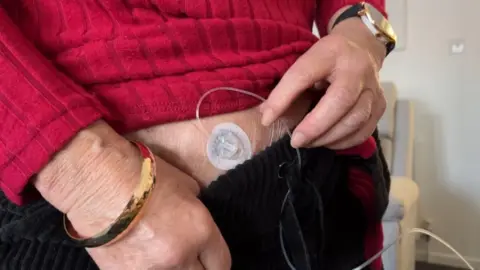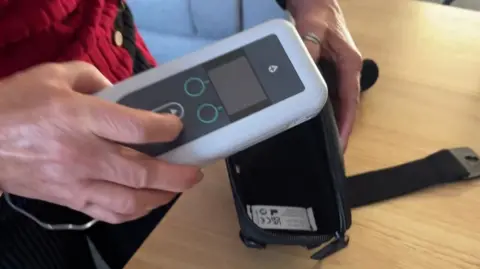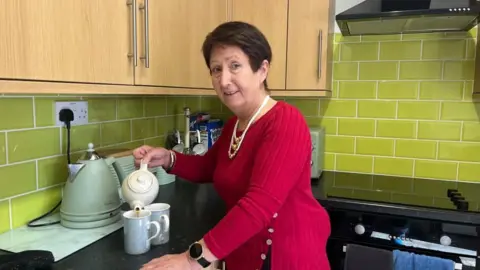Parkinson's drug a 'life-changer' for former nurse
 Andrew Turner/BBC
Andrew Turner/BBCA 65-year-old retired nurse said she had got her life back thanks to a new drug used to treat Parkinson's disease which controls tremors.
Jan Fuller, who lives in Hopton-on-Sea near Great Yarmouth, Norfolk, was diagnosed with Parkinson's disease in 2015, but her condition worsened in recent years.
She told the BBC that some days she could not get off the floor because the tremors left her unable to move, which made her reliant on her elderly parents, friends and carers.
In September she became the second patient at the Norfolk and Norwich University Hospital (NNUH) to be prescribed the drug Produodopa.
She said: "I am hopeful that if this continues then at least I have a chance at living a life and having a future."
 Andrew Turner/BBC
Andrew Turner/BBC Andrew Turner/BBC
Andrew Turner/BBCThe drug is administered via a pump worn around the midriff, which measures 8in x 3in (200mm x 75mm) and weighs 307 grams.
A fine tube connects the pump to a cannula that has to be changed daily.
Ms Fuller said although the system was "not easy to manage", it had been "a life-changer".
"I had no quality of life, but now my pain is reduced and my ‘on’ time increased," she said.
"Over the last year I have spent most of my days in pain and having dystonic spasms. I was getting more ‘off’ time when my medication could not control my symptoms.
"I was virtually housebound before and I had people come to check on me, to make sure I was able to get to the kitchen to get something to eat and drink."
She added: "I can’t thank everyone enough to be given the chance to benefit from this groundbreaking treatment."
 Andrew Turner/BBC
Andrew Turner/BBCThe treatment is a combination of two drugs - Foslevodopa and Foscarbidopa – and helps manage Parkinson's symptoms, such as excessive movement or tremors.
The continuous infusion enters the patient's bloodstream through a cannula under the skin and is controlled by an automatic pump, releasing a steady flow of the treatment to stay on top of symptoms.
Ms Fuller added: "Before this treatment my quality of life was poor.
"For the first four days on the treatment I had no problems and only minor symptoms.
"Since then, I get episodes of breakthrough tremors and dystonia, but I’m learning how to try to deal with these by using the pump and giving myself a higher or lower rate of the drug.
"Produodopa is not a cure, but it does control some of the symptoms."
 Norfolk and Norwich University Hospital
Norfolk and Norwich University HospitalDr Vaclav Dostal, a consultant neurologist at NNUH, said it was the first new treatment for Parkinson's "in decades".
"We are proud to be the first hospital in the region to offer Produodopa to patients with Parkinson’s disease, which is a real game-changer to help control symptoms," he said.
"We are able to treat a very small number of patients at the moment, but hope more will benefit as we get this service established."
Follow Norfolk news on BBC Sounds, Facebook, Instagram and X.
